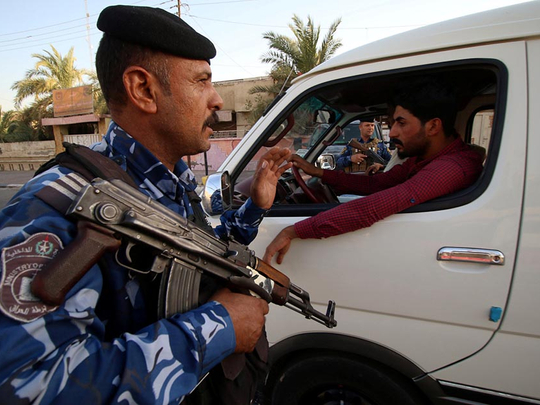
Baghdad: Two demonstrators were killed and dozens wounded in southern Iraq on Sunday as protests over unemployment and a lack of basic services entered a second week, a medical source said.
The protesters were killed in a shooting in the city of Samawah, south of the capital Baghdad, the source told AFP.
A further 27 people were injured in the incident in front of the governor's headquarters, the source said without detailing who opened fire.
Iraqis demanding better public services and jobs took to the streets again on Sunday in the southern oil-rich province of Basra, as authorities put security forces on high alert and blocked internet on the sixth day of protests in the country's Shiite heartland.
Thousands of protesters gathered outside the local government building and closed the roads leading to major oil fields north and west of the city of Basra on Sunday, activist Laith Hussein told The Associated Press over the phone.
Security forces guarding the local government building opened fire, causing some protesters to scatter away, he added.
Elsewhere in Basra, protesters also forced authorities to close the vital Um Qasr port on the Arabian Gulf, and planned to march to the border crossings with Kuwait and Iran, he said.
Around noon, Basra anti-riot police fired water cannons and tear gas to disperse the protesters, said Sadiq Saleh, one of the demonstrators.
Clashed left 50 people injured near the governor's headquarters, the majority protesters, a separate medical source said.
"I will not leave my place here until I get all my rights," said the 35-year-old who has been out of work for the past three years. "The government lies to us, they always give us such promises and we get nothing."
In Baghdad hundreds of protesters closed a highway at the entrance to the city's northwestern Shula neighbourhood, chanting "Iran, out out! Baghdad is free!" and "The people want to overthrow the regime".
On Saturday night, a group of protesters tried to break into the headquarters of Badr Organization, one of the powerful Shiite parties, which also has an armed wing, but the guards opened fire, wounding some of the protesters, Hussein said.
He could not confirm whether there were fatalities from either of the incidents. Health and police officials were not immediately available to comment.
There were also similar protests on Saturday in Baghdad. Hundreds poured into Baghdad's Tahrir Square and the eastern Shiite district of Sadr City. Some protesters set tires on fire and tried to break into the Badr Organization's office in Sadr City, prompting guards to open fire. No casualties were reported.
Protests in Basra boiled over on Tuesday, when security forces opened fire, killing one person and wounding five people, and spread to other provinces within days. Angry mobs broke into local government buildings and burned the offices of some political parties in some cities.
In Najaf, the protesters broke into Iraq's second-busiest airport, causing damages to the passenger terminal and delaying fights.
Citing security concerns, Kuwait Airways and the Royal Jordanian suspended their flights to Najaf until further notice. Flights to other Iraqi airports have not been affected, they said.
Also, FlyDubai, based in the United Arab Emirates, said it cancelled Saturday's flight to Najaf and suspended all flights until July 22. It added the carrier will continue to monitor the situation.
Iraq PM orders funds to calm Basra protests
Two killed in southern Iraq as protests spread
As the protests continued Abadi met with security and intelligence chiefs in the capital Baghdad on Sunday, warning them to be on alert "because terrorists want to exploit any event or dispute".
"Iraqis do not accept chaos, assaults on the security forces, state and private property, and those who do this are vandals who exploit the demands of citizens to cause harm," he said.
The prime minister also ordered security services not to use live fire against the unarmed protesters.
In a bid to contain the protests, Iraqi Prime Minister Haider Abadi dispatched a six-minister committee headed by the oil minister, Jabar Ali Luaibi. The committee promised jobs for those living in the areas around the oil fields and announced allocations for urgent projects, mainly for water.
On Friday, Abadi flew to Basra from the NATO summit in Brussels to try to diffuse the unrest. He also asked the state-run Basra Oil Company to provide more jobs to locals and announced urgent allocations.
But that didn't assuage the protesters.
"These announcements are just anesthetization to the residents of Basra," Hussein, the activist, said. "Every year, they give the same promises, and nothing happened on the ground."
The only solution is "to replace the current faces that represent the parties that failed to develop Basra by new faces from new political parties from Basra itself," he also said.
Like others, Hussein demanded Baghdad give more powers to a new, local Basra government.
The demonstrations were given a boost after a representative of the Shiite community's spiritual leader, the Grand Ayatollah Ali Al Sistani, offered his solidarity with the protesters during Friday sermon, but called for peaceful demonstrations.
Basra is Iraq's second-largest province and home to about 70 percent of the country's proven oil reserves of 153.1 billion barrels. It is located on the Persian Gulf bordering Kuwait and Iran, and is Iraq's only hub for all oil exports nowadays to the international market.












